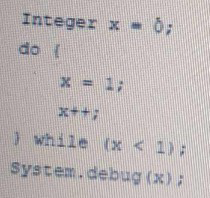Salesforce-Platform-Developer Practice Test
Updated On 1-Jan-2026
237 Questions
Universal Containers wants to assess the advantages of declarative development versus programmatic customization for specific use cases in its Salesforce implementation. What are two characteristics of declarative development over programmatic customization? Choose 2 answers
A. Declarative code logic does not require maintenance or review.
B. Declarative development has higher design limits and query limits.
C. Declarative development can be done using the setup menu.
D. Declarative development does not require Apex test classes.
D. Declarative development does not require Apex test classes.
Explanation:
Declarative development uses point-and-click tools, while programmatic uses code. Key differences include setup, limits, and testing.
Correct Answers:
C. Declarative development can be done using the setup menu.
→ Configured via clicks (no code) in Salesforce Setup (e.g., Flows, Validation Rules).
D. Declarative development does not require Apex test classes.
→ Unlike Apex, no test coverage needed for deployment.
Why Others Are Wrong?
A: Declarative logic still requires maintenance (e.g., updates when fields change).
B: Declarative tools often have lower limits (e.g., Flow transaction limits).
The following automations already exist on the Account object;
• A workflow rule that updates a field when a certain criteria is met
• A custom validation on a field
• A How that updates related contact records
A developer created a trigger on the Account object.
What should the developer consider while testing the trigger code?
A. The flow may be launched multiple times.
B. Workflow rules will fire only after the trigger has committed all DML operations to the database.
C. A workflow rule field update will cause the custom validation to run again.
D. The trigger may fire multiple times during a transaction.
Explanation:
When working with Apex triggers, developers must understand that a trigger can execute multiple times during a single transaction. This happens due to various factors such as recursive execution caused by workflow field updates, flows, and additional DML operations occurring within the same transaction.
In this scenario:
Workflow field updates can modify record values, which may re-trigger validation rules and other workflows.
Flows can cause additional updates that might also trigger the same Apex code again.
Triggers execute at different points in the transaction lifecycle, meaning multiple executions can occur based on record modifications.
This recursive behavior is essential for developers to anticipate while writing and testing trigger logic. To prevent infinite loops, developers often use techniques such as:
Static variables to track execution status.
Trigger context variables (e.g., Trigger.isUpdate, Trigger.isInsert) to control execution flow.
A Lightning component has a wired property, searchResults, that stores a list of Opportunities. Which definition of the Apex method, to which the searchResults property is wired, should be used?
A. @AuraEnabled(cacheable=true)
public static List
B. @AuraEnabled(cacheable=true) public List
C. @AuraEnabled(cacheable=false) public static List
D. @AuraEnabled(cacheable=false) public List
Explanation:
Since the Lightning component uses a wired property, the Apex method must:
✅ Be cacheable → cacheable=true ensures improved performance by allowing the Lightning framework to store and reuse data without unnecessary Apex calls.
✅ Be static → Wired properties expect static methods that do not rely on instance-specific data.
✅ Return a List of Opportunities → Since searchResults stores a list of Opportunity records, the method must return List
Refer to the following Apex code: What is the value of x when it is written to the debug log?
What is the value of x when it is written to the debug log?
B. 1
C. 2
D. 3
Explanation:
Let’s break down the code execution step-by-step:
Initialization:
Integer x = 0; // x starts at 0
First Loop Iteration:
x = 1: Assigns x the value 1.
x++: Increments x to 2.
while (x < 1): Checks if 2 < 1 → false → loop exits.
Final Value:
System.debug(x); // Outputs: 2
Universal Containers hires a developer to build a custom search page to help user- find the Accounts they want. Users will be able to search on Name, Description, and a custom comments field. Which consideration should the developer be aware of when deciding between SOQL and SOSL? Choose 2 answers
A. SOSL is able to return more records.
B. SOQL is faster for text searches.
C. SOSL is faster for tent searches.
D. SOQL is able to return more records.
D. SOQL is able to return more records.
Explanation:
1️⃣ SOSL is faster for text searches (C)
SOSL searches across multiple objects and fields in a single query, making it more efficient for text-based searches.
It scans indexed fields quickly, making it ideal for searching Name, Description, and Comments fields in large datasets.
Best for keyword searches, such as finding records containing a specific phrase.
2️⃣ SOQL is able to return more records (D)
SOQL retrieves a larger result set, allowing up to 50,000 records per query, while SOSL returns only the first 200 records per object.
SOQL is best when searching structured data with filtering, such as retrieving Accounts based on specific criteria.
Ideal for querying specific fields from a single object, rather than searching text across multiple objects.
| Salesforce-Platform-Developer Exam Questions - Home | Previous |
| Page 5 out of 48 Pages |